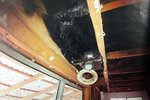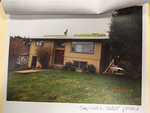A contractor hired to repair a fire-damaged Port Townsend home is protesting what he says are excessive city permit fees and delays in issuing permits for the project by placing large plywood signs …
This item is available in full to subscribers.
We have recently launched a new and improved website. To continue reading, you will need to either log into your subscriber account, or purchase a new subscription.
If you had an active account on our previous website, then you have an account here. Simply reset your password to regain access to your account.
If you did not have an account on our previous website, but are a current print subscriber, click here to set up your website account.
Otherwise, click here to view your options for subscribing.
* Having trouble? Call our circulation department at 360-385-2900, or email our support.
Please log in to continue |
|



A contractor hired to repair a fire-damaged Port Townsend home is protesting what he says are excessive city permit fees and delays in issuing permits for the project by placing large plywood signs in the front yard.
“It took the city 6 weeks for a repair permit. Then they charged $1,816.44,” one of several signs at 535 Harrison St. declared.
Michael McCutcheon, who is doing the repair work with Olympic Steel on behalf of the owner, said the City of Port Townsend initially estimated it would cost $900-$1,200 for a permit for the work.
“That’s pretty standard,” he said of the estimate. However, the final cost of the repair permit was $1,816.44, which McCutcheon felt was excessive. The permit, which was posted outside the home, showed not just one but two entries for “plan review fees” at $352 each, as well as two entries for “building permit fees” at $542 each.
“He just doubled everything,” McCutcheon said of the city employee who doubled the fees.
CITY RESPONSE
Lance Bailey, director of Development Services for the city, said the higher fees were a result of McCutcheon doing some initial work without a permit, and that the city filed a “stop work” order as a result of that work.
City building inspector Dennis Perkon posted the “stop work” order on the home on Jan. 31 after seeing that roof trusses and other repair materials had been placed on the home.
McCutcheon countered that the initial work was basic cleanup and board-up work. The preparatory work was similar to the sort of basic work a cleanup company like Servpro might do, McCutcheon said, adding that the city did not require Servpro to get permits for that sort of work.
Bailey said that if the only work being done at the home was related to cleaning up, then no permit was needed. But if the work involved demolition or changing the structure of the property, a permit was needed, he said.
McCutcheon said he went ahead and paid the $1,816.44 fee “just to keep going forward. It was a ripoff. And what it does is it raises the price of all our insurance,” he said.
“It’s just wrong that one person in the city makes the decision that he’s going to charge double the fees,” McCutcheon said.
McCutcheon also said it took too long – six weeks – for the city to finally grant the permit.
A clerk with the city’s Development Services department said the request for a permit was originally filed Jan. 11, which means it took the city six weeks and four days to issue the permit, on Feb. 27. The department received a request to expedite the permit on Feb. 6 so that the tenant who was displaced by the fire would be able to return to his home sooner.
“I think people really need to know what’s going on … the neighbors need to know why it took so long to get a permit because it will happen to somebody out there again,” McCutcheon said.
“I don’t believe that any organization should have the right to control anybody like that,” he said.
DECEMBER FIRE
McCutcheon was doing the work to repair damage caused by a fire that broke out in the home on Dec. 12, 2017.
Bill Beezley, public information officer for East Jefferson Fire Rescue (EJFR), said firefighters were dispatched to the fire at 9:31 p.m. The home is one block away from the Uptown fire station. Firefighters arrived at 9:33 p.m., Beezley said.
McCutcheon said the fire department did a good job in limiting smoke damage to the house. He said firefighters cut a hole in the roof to vent the smoke.
“The place was in pretty good shape,” he said.
The fire displaced a tenant in his 70s who had failing health, McCutcheon said.
McCutcheon said he thought the Red Cross provided housing for the man immediately after the fire, and that the tenant had since moved into an assisted living home.
EJFR fire investigator Wayne Kier wrote that the probable cause of the fire was that someone had placed an incandescent bulb of the incorrect size into a ceiling light fixture in the kitchen. The light fixture overheated, causing insulation in the attic to catch on fire, Kier wrote.
Repairs to the house are to include new asphalt roofing material, seven new roof trusses, new cabinets, a new kitchen floor, a new bathtub, a new floor in the bathroom, new carpeting and more.
According to city documents, Olympic Steel LLC is to be the primary contractor for the work, and the valuation of the repair is $40,000.
According to Jefferson County Assessor records, the property has a value of $276,976.
The home should be repaired by April 1, McCutcheon said. The home is owned by Amell Family Limited Partnership, which has an address in Concord, California.
WITHOUT PERMIT
Bailey said it was apparent that there was “work going on in the absence of a permit,” and that the work at 535 Harrison St. was “over and beyond just cleanup.”
Bailey said that trusses leaning against the building and materials placed on the roof “reasonably” led the building inspector to believe work was being done at the property.
Complicating matters was that the city was not sure about the legality of how the home had been subdivided into multiple rental units including a “535 B” address, Bailey said. Resolving that question took time before the city could issue the permit. The city eventually determined the subdivision was acceptable.
Bailey said public safety was one of the city’s main concerns when it came to the permits. He noted that in the three years he’s worked for the city, there had been a number of house fires.
“There seems to be an uptick” in home fires, Bailey said, including a fire that resulted in a fatality.
Bailey noted that an illegal dwelling at GreenPod Development had caught on fire in February as a result of an electrical problem.
“Our antenna’s up a little bit in making sure that structures out there are code compliant,” Bailey said.
The city also intended to be consistent about how rules were applied, Bailey said.
“I think our policy is the right thing to do,” Bailey said.
Beezley said EJFR hadn’t had “any particular surge” in the call volume and said call volume in general was lower compared to call volume at this time last year.
“There’s not a real spike in structure fires ... it’s been pretty calm for the last six months or so, at least,” Beezley said.
Beezley said that occasionally there was a higher report of fires in the winter due to reports of chimney fires.
SHORT ON STAFF
Bailey said another factor was that the city had been short a key building official staff member for six months. The position is now filled by Angela Garcia, whom Bailey said has now been working for the city for about a month.
But due to the time it took to fill that position, Bailey said, there had been a backlog of work building up.
“We moved this one up in our queue” to help the displaced tenant, Bailey said of fast-tracking the permit for the project at 535 Harrison St.
Bailey said that the workload for processing of permits varied, and that some builders put in their requests for permits well before work began.
IN FAVOR OF PROCESS
McCutcheon said he agreed with the safety goals of the permitting process.
“I totally agree with permits,” McCutcheon said of the permit process in general.
The permit fees were necessary to fund an important city service that ensures all work is done safely and up to code, McCutcheon said, “so we don’t have fires … building collapsing, that sort of of thing … You don’t Mickey Mouse it.”
He added, however, that “it’s not supposed to be a penalty type of thing.”